You have /5 articles left.
Sign up for a free account or log in.
--With Mike Golovan
***
It’s hot in the Hotel Dostoevsky, but it’s hot everywhere in St. Petersburg, Russia. The Dostoevsky, named for its mere proximity to an apartment the writer rented for three years, is advertised as a four-star hotel with air-conditioning. But air, natural or conditioned, hardly registers in the rooms, let alone in the Raskolnikov Bar, where I’m writing this in the heat of giant windows looking over the rooftops, and Frenchy naps behind half a liter of warming beer.
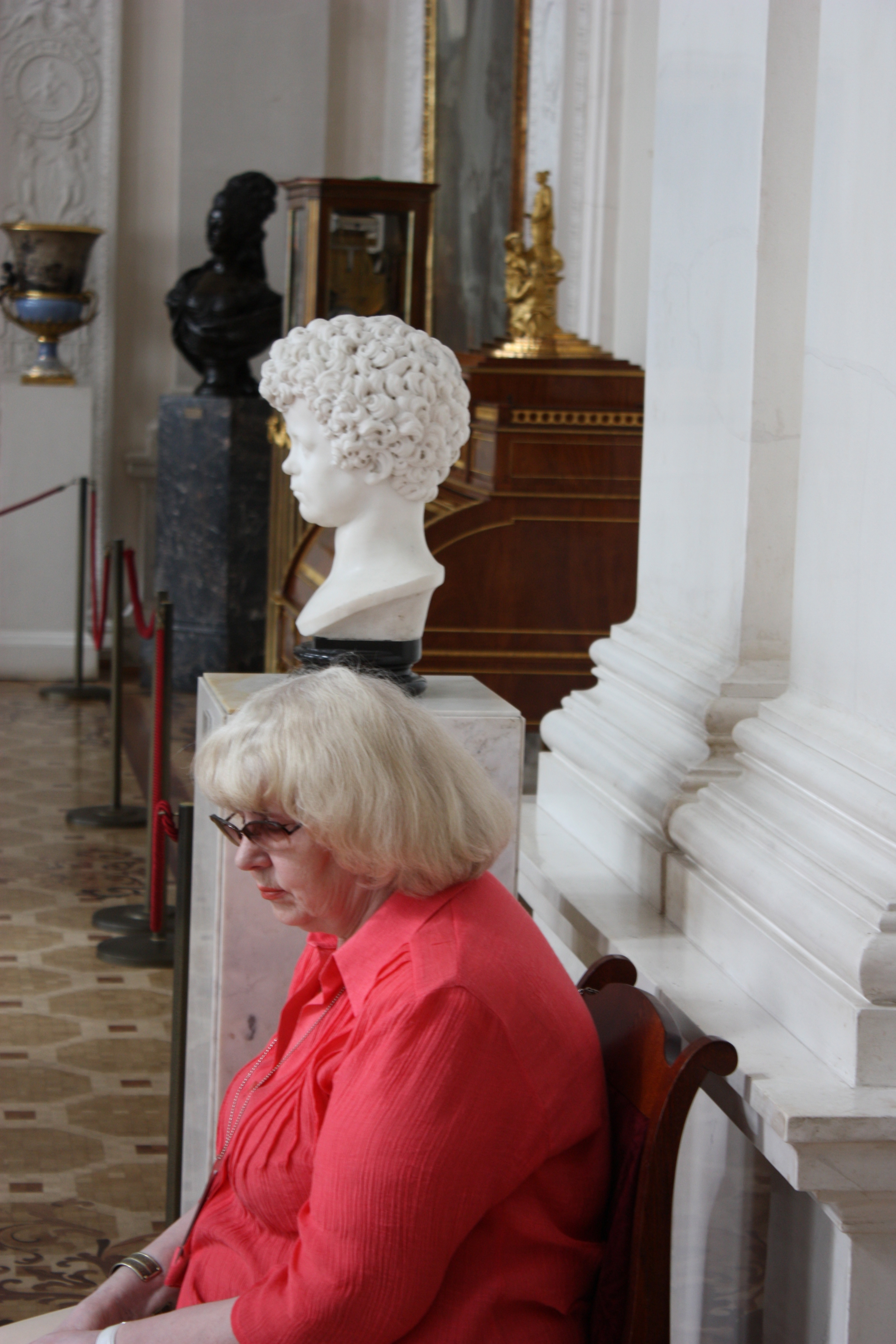 Even the guards in the Hermitage, nicely-dressed older ladies, were asleep on chairs in their galleries yesterday. Who wouldn’t be? It was stiflingly hot and still, and Russians seem to like to stay up late. I took photos of some of the matrons, interesting as any exhibit, then signed a contract for a coffee-table book with Phaidon, to be called Drowsing in the Winter Palace in the Anthropocene.
Even the guards in the Hermitage, nicely-dressed older ladies, were asleep on chairs in their galleries yesterday. Who wouldn’t be? It was stiflingly hot and still, and Russians seem to like to stay up late. I took photos of some of the matrons, interesting as any exhibit, then signed a contract for a coffee-table book with Phaidon, to be called Drowsing in the Winter Palace in the Anthropocene.
It was hot this past week in the town of Chekhov, too, an hour-and-a-half south of Moscow by metro and minibus. Chekhov is a former industrial town that used to be called Lopasnya and has about 75,000 inhabitants, many just arrived from the former central Asian provinces of the Soviet Union. The Russian General Staff wartime headquarters is deep underground nearby and is said to be connected by secret metro line directly to the Kremlin.
Chekhov’s former country estate, Melikhovo, is about five miles out of the town renamed for him. He owned the property from 1892 to 1899, the period after his arduous Sakhalin trip, and the place where he wrote plays and many of his best and most widely-anthologized stories, including “The Lady with the Dog.” By all accounts it was one of the happiest periods in his life. He lived in the main house with his father, mother, and sister Maria, and wrote there, and in the guesthouse, where he first hosted actress Olga Knipper, whom he married two years later. Olga describes the estate in her memoirs:
I spent three wonderful days at Melikhovo.... Everything breathed comfort, a simple healthy life, you could feel the presence of a loving family. [...] He was so joyful, so happy. He showed me his ‘domain’: a pond with carp, of which he was very proud—he was a passionate fisherman—the kitchen’s garden, the flowers. He loved gardening, he loved all earth’s gifts. I found everything there enchanting: the house, the little cottage where he wrote The Seagull, the garden, the pond, the flowering fruit trees, the calves, the ducks, and the village schoolmistress, running along the road with her pupils. They were three days full of wonderful intimations of the future, full of joy and sun. (trans. Jean Benedetti)
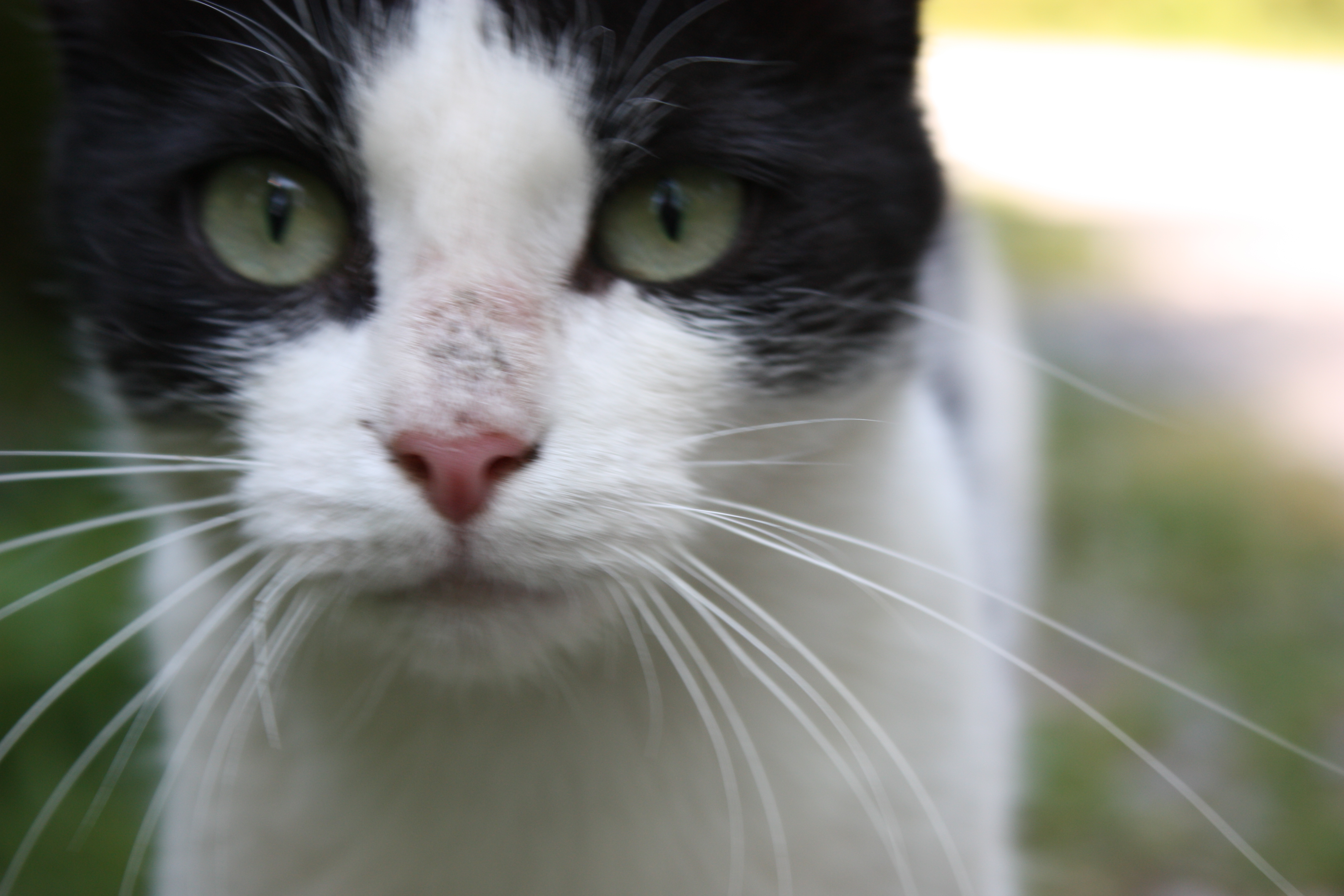
Our host was Mikhail Golovan, Head of Science and Information Center, Literature and Memorial Museum-Reserve of A.P. Chekhov. Mike, as he likes to be called, is a former colonel in the Russian army who, when he was a University student, served as an assistant to a ground navigator of Mig 25s in their reconnaissance flights in 1972 before the Yom Kippur War, and later served as chief editor for the Russian army English publications division. When Frenchy and I failed to find the local bus from Chekhov to Melikhovo, a taxi driver took pity and called Mike on his cell, and within three minutes Mike appeared cheerfully in the new Nissan sedan he calls The Bluebird. He got us out to the estate, through the ticket office, and introduced us to his colleagues, including a middle-aged woman with a Pomeranian at her feet.
“Lady with the dog!” Mike exclaimed.
As we walked, Mike tried to make Chekhov come alive. "When the Chekhovs moved to Melikhovo in early March 1892, Anton was only 32. He was a very handsome, tall man with red-brown wavy hair and kind eyes. He had a soft, baritone voice. They said he was uncommonly kind to all people he talked to, a charming person for women and a good companion for men....
"Chekhov wrote more than forty stories and two plays in Melikhovo. Among the stories: 'The Black Monk,' 'Ward No. 6,' 'The Student,' 'Rothschild’s Fiddle,' 'Anna on the Neck,' 'Ariadne,' 'My Life,' 'An Artist’s Story,' 'The House with the Mezzanine,' 'Peasants,' 'Gooseberries,' 'The Man in a Case.' and 'About Love.' The plays were Uncle Vanya and The Seagull."
He set the scene of Chekhov's final departure: "Chekhov visited Melikhov for the last time in August 1899, after it was sold. He slowly walked up the stairs to the balcony of the Guest House and took a seat on a wicker chair. I think he looked up to the small red ensign waving in the wind (indicating the Master was at home) and hauled it down the flagpole. Then he sat gazing at his former estate, saying farewell to the best years of his personal and creative life. His feelings would have been warm, sad, and sentimental, for the home where he had been so happy."
After 1927 the estate became a state collective farm, the main house was torn down, and the property reconfigured. By 1960 the house was rebuilt from original plans, the guest house had been repaired, and the gardens and fruit trees replanted. The property might be compared now to a state park in the US, something smaller, say, than Lincoln’s New Salem, but visitors come from all over to see what life looked like in the late nineteenth century. There are recreated log buildings, a stable, a theater that puts up plays year-round, and the opportunity to have hours-long tea parties on a breezy porch. The house contains many of Chekhov’s personal belongings, furniture, books, artwork, drafts, and letters. Mike said that Russian museums have about 4,000 letters by Chekhov, and in Melikhovo he wrote 2422 letters to his relatives, friends, fellow writers, muses and publishers.
My first impression as we walked to the quarters for visitors was driven no doubt by my admiration for Chekhov as both writer and person: There is something very special about the place, which I haven’t felt as strongly at other literary-historical sites. (The Dostoevsky and Anna Akhmatova apartments in St. Petersburg don’t compare, eg. Neither does the Twain boyhood home, where the child who would become the writer had no real agency. Hemingway’s Key West house might come close, if only because it has a critical mass of atmosphere, size, and number of genuine artifacts, and it too was a haven, a hermitage, created by the writer, not by circumstance.)
Since no one else at the estate seems to speak much English, Mike cleared us with the head of security for the estate, introduced us to the housekeeper of the guest quarters, built like a hostel with shared baths and kitchen—“This place is for our dearest friends,” Mike said—and generally got us set up before leaving us to relax after difficult travel.
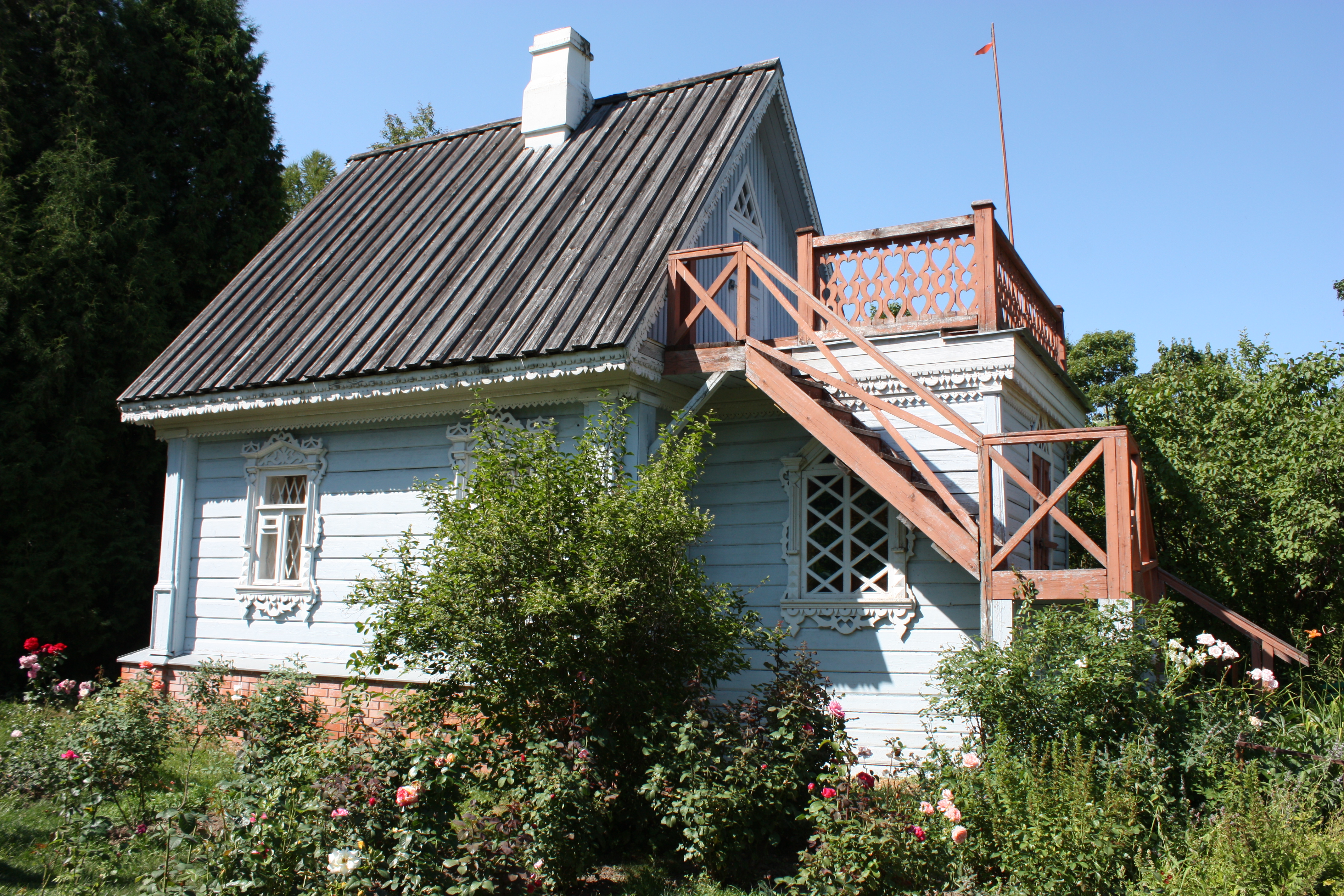
When I got back to the guest quarters, which had no other guests, I pulled out the bottle of cheap Russian champagne I’d bought for Chekhov’s grave in Moscow but didn’t use. Olga wrote of his last night, in Badenweiler:
"Anton sat up unusually straight and said loudly and clearly (although he knew almost no German): Ich sterbe ('I'm dying'). The doctor calmed him, took a syringe, gave him an injection of camphor, and ordered champagne. Anton took a full glass, examined it, smiled at me and said: 'It's a long time since I drank champagne.' He drained it, lay quietly on his left side, and I just had time to run to him and lean across the bed and call to him, but he had stopped breathing and was sleeping peacefully as a child...." (trans. Benedetti)
Frenchy is practical and unsentimental. He’s worked all his life at physical, often dangerous, tasks, including Army diving, where we met decades ago. As a result he sees everything in terms of work and its consequences. His champagne toast in the kitchen of the quarters: “I thank Anton for building this place so I can enjoy it.” For him, if something isn’t maintained and working, it’s nothing, and he tended the estate’s vegetables a little while we were there. There was a tour group standing by the pond the next morning, listening carefully to a guide speak in an Asian language, and Frenchy said, “Look at that scum-covered goddamned dead-ass pond. Anton couldn’t fish that thing.” But he knew that the cabins were put together skillfully (he lives in one in West Virginia) and discoursed on the oakum between the logs. We went through the exhibits in the main house and cookhouse and read the cards provided in English.
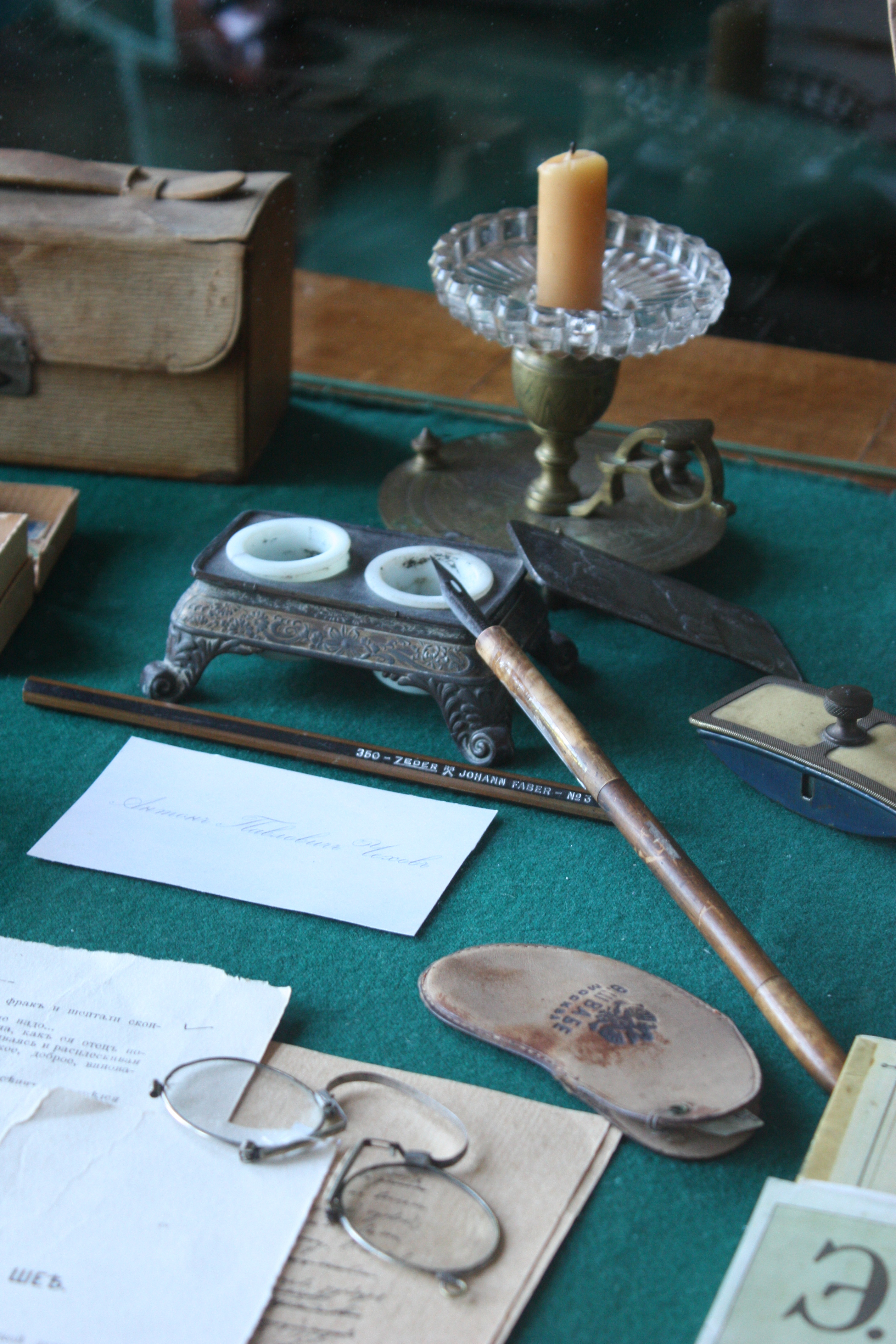 Mike appeared shortly afterward in a vaguely American outfit: New Balance shoes, jeans, belt, a striped polo shirt, ball cap, and shades. (It seems as if every t-shirt on every person in the streets of the two largest Russian cities has English wording or American themes, so talk about growing anti-Americanism if you will, but.....)
Mike appeared shortly afterward in a vaguely American outfit: New Balance shoes, jeans, belt, a striped polo shirt, ball cap, and shades. (It seems as if every t-shirt on every person in the streets of the two largest Russian cities has English wording or American themes, so talk about growing anti-Americanism if you will, but.....)
He took us through the buildings again, gave us more and better info and even got me into the guest house, where Chekhov wrote and Knipper stayed, normally closed to the public. Afterward he drove us in his car to a holy spring, to a church built with no nails, and to get money at the bank in town. He loves American WWII music (and country singer Jim Reeves), hates that the EU has built enormous warehouses on Russian agricultural fields, and told everyone who would listen that we’re Confederates, which is why he liked us, because the people fighting in Novorossia, ie, Ukraine, are like Confederates, especially after Poroshenko sent his own General Sherman—“understand?”—and laid waste to innocent people.
Mike’s grandfather was a wealthy farmer in the Slavyansk region (Ukraine) dispossessed by the Soviets in the early '30s, and his father Ivan had to join the Red Army in 1939. After the war Ivan served as an officer in the Soviet army in Hungary. Mike was a kid then and won an arts contest for a cat in boots that he molded. The prize was Twain’s Huck and Tom, in Russian, from the Red Army PX, and he’s loved American culture ever since and has devoted much of his life to fostering understanding between our two countries. Mike had been in conversation with an ex-Marine who lives in New Orleans, and I’m to take a Russian shirt and medal back to him in my bag, in exchange for the man giving Mike a U.S. Marine Corps cover (hat). As we said our first of two days’ goodbyes he asked me to proofread pages of text for the exhibits, and insisted I would write a piece about our adventures together—me, him, Frenchy, our mutual friend (another) Mike, who helped set all this up—and send it to him to make more interesting and to add facts I didn’t know. Nobody would believe me, he said—Russians wouldn’t believe me, and Americans wouldn’t believe him—so together we would author the essay. I said it would take time to write such an essay, and he said, “Of course, of course, two months!” He would have made a perfect Chekhov character.
In the evening the big horses were out of their pens, untethered and grazing near the front door of the guest quarters, and we fed them carrots and ate a few small tart cherries from the trees just to say we’d had them. There was a tiny front-loading washer in the kitchen of the guest quarters that took two hours to wash a load, and though it was getting late when my clothes were done I put them on the folding wire rack that the stern older housekeeper had said to use outside the front door. They began to dry in the last light of the long day, in the aroma of flowers, wild grasses, clover, and a pile of hot horseshit deposited next to the rack while I was inside.
“I thought an elephant passed by,” Frenchy said. He was back in the room reading stories from the Matlaw/Norton Chekhov.
“Well, if the horses carry off my laundry, at least I’ll have be able to say that Chekhov’s horses ate my laundry,” I said.
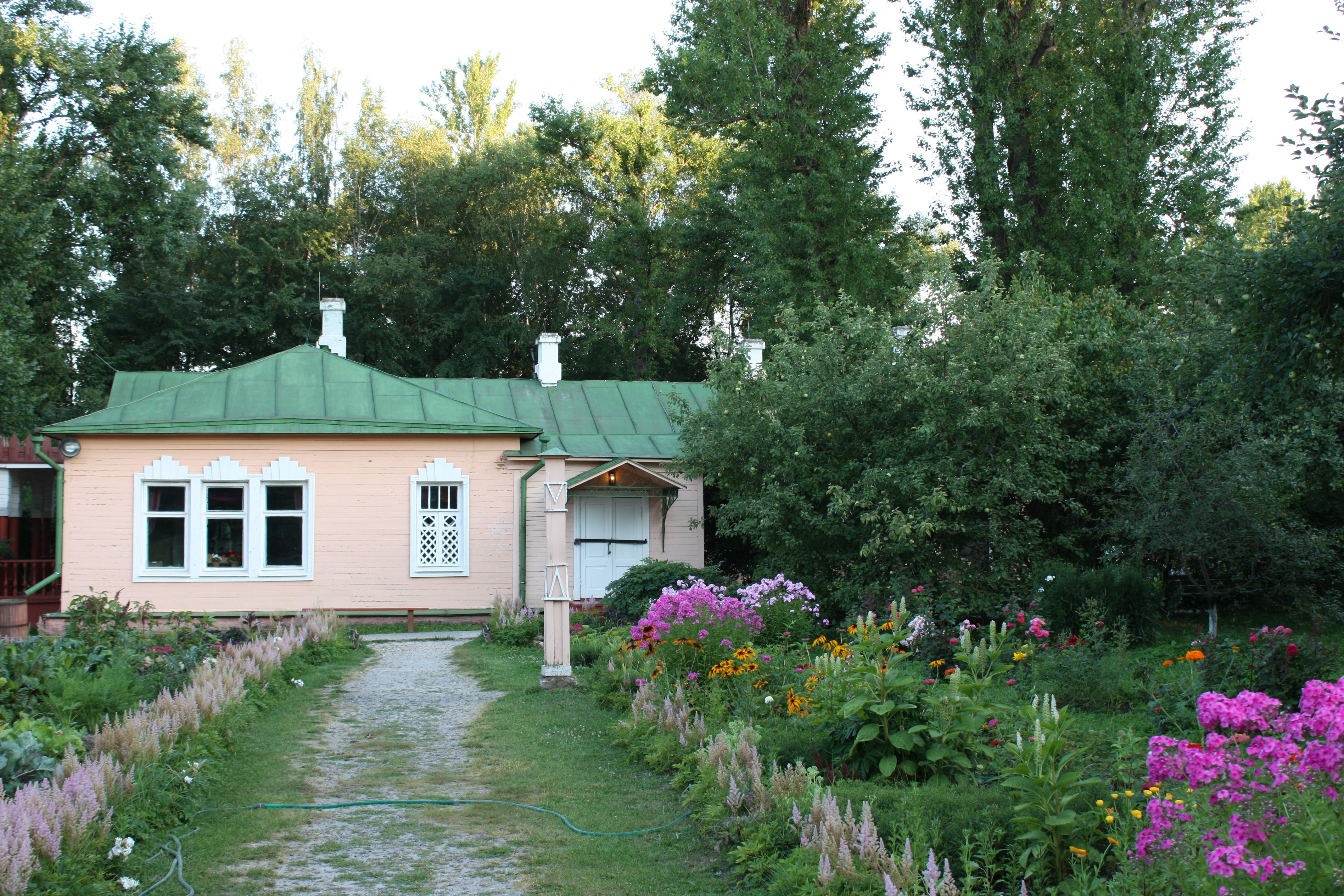
I tried to sleep in the heat as little dogs yapped at a distance and trucks motored on the road along one side of the property.
Before Mike got us a ride to the bus station the next morning, he came to show us one of his own albums, full of artifacts from an interesting life: Photos of him in uniform, clippings on his work as translator for an important project with the Russians and Boeing. After that he asked me sit on my bed while he sat on Frenchy’s and excitedly read aloud seven pages of notes he’d handwritten the night before, outlining the book we’d write together. It would be titled, My Brief Diving to Anton Chekhov, and while it would have, say, a chapter of critical-aesthetic praise for Chekhov, and one on the history and sociology of the town, etc., it would stress the incomprehensible strangeness of people from different countries and backgrounds being brought together, like planets in alignment, by the legacy of and continuing fascination with Anton Pavlovich Chekhov.....
“All of life and human relations have become so incomprehensibly complex that, when you think about it, it becomes terrifying and your heart stands still,” wrote Chekhov in the short story “In the Cart,” at Melikhovo.

